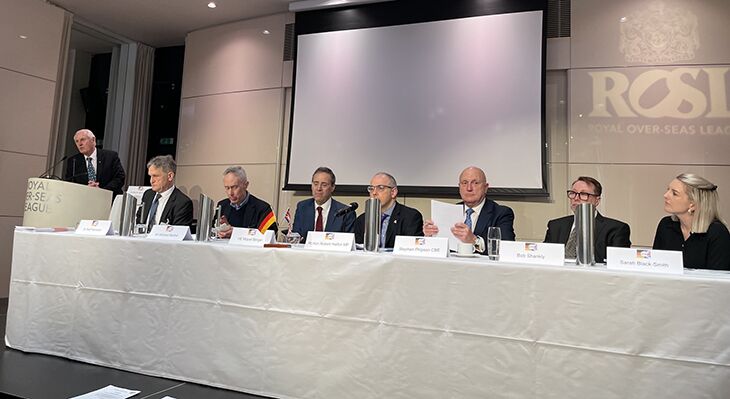VET in Great Britain: Skills shortage as a key challenge
03.04.2023
There is a shortage of well-trained skilled workers in the UK - in an ageing society. The United Kingdom wants to strengthen its vocational training system and is looking to Germany to do so. VET experts from both countries exchanged views at an event hosted by GIUK London.

Skills shortages in an aging society were the focus of the March 27 panel discussion on apprenticeships and skills in London, hosted by German Industry UK (GIUK) in cooperation with the German Embassy in the UK and the British Chamber of Commerce in Germany. Miguel Berger, German Ambassador and patron of GIUK, and Dr. Bernd Atenstaedt, GIUK Executive President, opened the event. In several keynotes, leading British vocational education and business experts presented the challenges of vocational education in their country.
The British Minister for Skills, Apprenticeships and Higher Education, Rt Hon Robert Halfon, expressed his great appreciation for the German dual system and his admiration for the education and skills culture in Germany. He also outlined a comprehensive set of measures of the new British government that is supposed to reinvigorate initial and further training in the UK. Sir Michael Barber, who is currently advising the UK government on skills programs and the ongoing reforms, was positive about a momentum for coherent VET and apprenticeship policies now. At the same time, he highlighted the need for a cross-societal attitude of appreciation and esteem for vocational training, qualifications and skills. Thus, he said, it is imperative that in addition to policy changes, there is also a change in mindsets – in families, educational institutions and businesses.
Stephen Phipson CBE, Chief Executive of MakeUK, Britain’s leading manufacturing organisation, pointed at the skills gap plus the increasing skills shortages due to demographic changes as the greatest challenge for the economy. It takes advanced technological competences as well as the fundamental industrial and crafts occupations for the necessary transformation processes. The UK perspectives were accomplished by Bob Shankly, HR Director, BMW Manufacturing (UK) Ltd (MINI), and Sarah Black-Smith, General Manager, Motion Control Business, Siemens plc, with best practices of in-company training and development.
Dr. Ralf Hermann, Head of GOVET, provided information on the German vocational training system and highlighted the formative role of education for innovation processes. In his presentation, he focused on the current challenges in vocational education and training – which, similar to the UK, go hand in hand with the megatrends of digitalisation and sustainability as well as demographic changes and the shortage of skilled workers. In order to meet these challenges, established cooperative governance structures with the participation of state, employers, employees and chambers are success factors of the German system, as are acknowledged standards and the orientation of work-based learning towards comprehensive acting competency. A broad understanding of vocational competencies beyond the immediate task or job, is of central importance for dual vocational education and training. It is also the solid basis for continuing education and life-long learning. This is all the more important within the framework of transformation agendas such as digitalisation and sustainability.
The discussion led to a number of core topics of VET policy and practice, such as vocational orientation, which in Germany is characterised by an early encounter with the world of work, inclusivity with regard to gender, age groups, migration and socio-educational disadvantages; the optimisation of continuing education and training; and better interplay between vocational and higher education.
VET in Great Britain
There is no "dual system" as in Germany in England, Scotland, Northern Ireland and Wales. The vocational training system in Great Britain is complex and decentralised.
It has a modular structure and individual modules are certified and can be combined to produce a qualification. Vocational education and training is provided by various players:
- schools
- secondary state schools (further education colleges),
- universities,
- private providers and
- companies